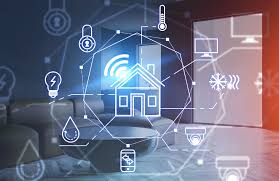Smart Home Automation

Smart home automation refers to the use of technology to control and automate household systems and appliances remotely. This includes lighting, heating, security, entertainment systems, and even kitchen appliances. These devices are typically connected through a central hub or app, allowing users to manage them via smartphone, voice assistant, or scheduled routines.
At the heart of smart home automation is the Internet of Things (IoT), which enables everyday devices to communicate with each other and with the user. For example, a smart thermostat can learn your temperature preferences and adjust accordingly, while smart lights can be programmed to switch off when no one is in the room. These features not only enhance convenience but also contribute to greater energy efficiency.
One of the most popular applications of smart home automation is in home security. Systems now include smart door locks, video doorbells, motion detectors, and connected surveillance cameras that provide real-time monitoring and alerts. Homeowners can check on their property from anywhere in the world, offering peace of mind and quicker response times in case of emergencies.
Voice control has also become a staple in smart homes. Virtual assistants like Alexa, Google Assistant, and Siri allow users to control multiple devices using simple voice commands. Whether it's playing music, dimming the lights, or adjusting the thermostat, these assistants make interacting with your home more seamless and intuitive.
Energy management is another significant benefit of smart automation. Smart plugs and appliances help monitor power consumption, while smart thermostats and lighting systems optimize usage patterns to reduce waste. Over time, this can result in noticeable savings on utility bills and a smaller environmental footprint.
The integration of smart home technology is also improving the lives of the elderly and people with disabilities. Automated lighting, voice-activated controls, and health-monitoring systems enable more independent living and provide caregivers with vital updates and alerts, creating safer and more comfortable environments.
Despite its many advantages, smart home automation comes with some challenges. Privacy and security are major concerns, as connected devices can be vulnerable to hacking if not properly secured. It also requires a stable internet connection and can involve a higher upfront cost, especially when outfitting an entire home.
Nevertheless, the convenience, efficiency, and customization that smart home automation offers are transforming how we live. As technology advances and prices become more accessible, more households are embracing smart solutions to create homes that are not just connected, but also intelligent and responsive to their daily needs.